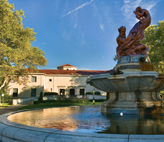The graduate program in history of art and architecture is a doctoral program designed to train new generations of scholars who will lead the way in advancing and disseminating art-historical knowledge, whether in research universities, teaching colleges, museums and galleries, or other related professions. The program is based in research Constellations that encourage idea-driven scholarship and interdisciplinary work. These Constellations unite faculty and graduate students around shared intellectual questions and interpretative approaches, meant to be flexible and evolving. At the same time, the program recognizes that in-depth knowledge of particular historical and geographical areas remains the foundation of any serious intellectual inquiry in our discipline.
Our Constellations program began in 2011-12. Since then it has evolved into productive collaborations between faculty and graduate students that have yielded publications, exhibitions, digital humanities research platforms, conferences, colloquia, and field trips. Given the success of the Constellations in generating new research and knowledge, the Provost and Dean of the Dietrich School of Arts and Sciences have recently allocated endowment funds to our department for the purpose of supporting graduate education. We now offer all of our graduate students five years of year-round guaranteed funding. This funding, which will extend through the summer months, will allow our students the flexibility to pursue curatorial projects, digital humanities initiatives, language training, dissertation research, and other professionalizing experiences. We are excited about the possibilities this new funding opens up for our graduate program. For more information about graduate funding, including the generous research travel support our department provides, please see Financial Aid.
In our graduate program, students work closely with faculty to ensure that they acquire foundational knowledge of artistic production in an historical and geographical area, but will assemble dissertation committees from the research Constellations in which faculty operate. The goal is to produce work that displays command over a particular historical and geographical area, and at the same time contributes to the ideas that give life to the department’s Constellations. Curriculum requirements, teaching assistantships, research assistantships, and other appointments also give students the opportunity to study and learn broadly. Study outside the History of Art and Architecture department, in humanistic and social science disciplines, and in the information sciences, is also expected in order to begin framing the kind of interdisciplinary questions that teaching, scholarship, curation, and related fields increasingly demand.
With our new funding structure in place, we expect students to be able to complete the PhD in a timely fashion; the MA degree is granted in the second year as a step toward the doctorate. As noted above, we fully fund all our doctoral students with generous multiyear packages of financial support, including fellowships and teaching assistantships. The department has a strong teacher training program.
We invite graduate students to take an active role in department governance. Graduate students participate on department committees and in department meetings, and have a collective vote on questions of department policy, faculty hires, and other matters. For more information, see the department bylaws.
The University of Pittsburgh is now offering a Film Studies PhD with a concentration in History of Art and Architecture and students interested in pursuing this option must apply to and fulfill degree requirements in both programs. The HAA faculty members able to supervise Film Studies students are Josh Ellenbogen and Terry Smith. Students interested in this option should visit the Film Studies website.
Events
No events to display.
News
Newsletter
Contact
History of Art & Architecture
104 Frick Fine Arts Building
Pittsburgh, PA 15260
412-648-2400






